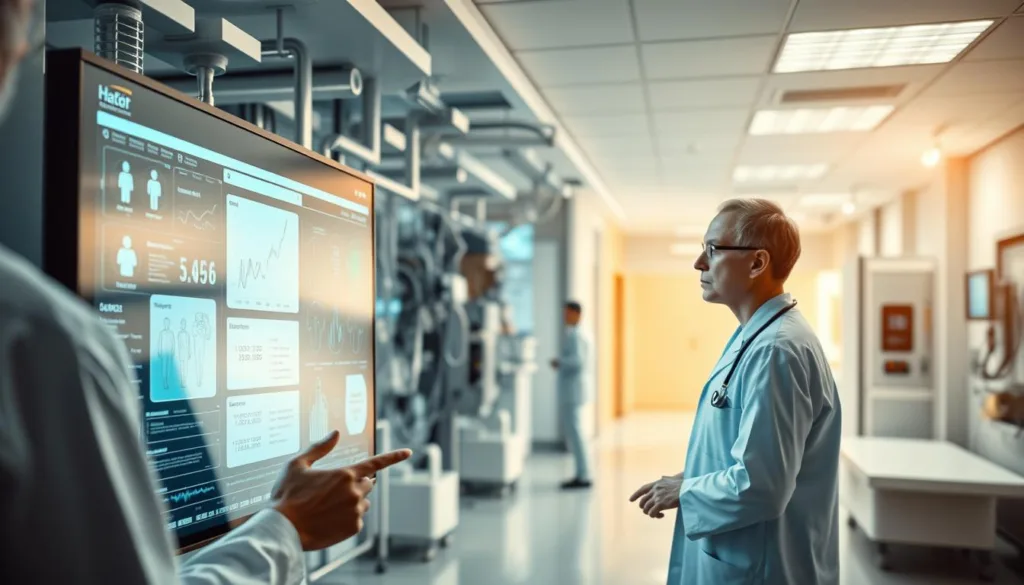Agentic AI in healthcare is changing medicine in big ways. It uses systems that can act on their own and learn from what they do. These smart systems help tackle big problems like 42% of U.S. doctors feeling burned out and 10% of patient deaths due to wrong diagnoses.
By mixing human skills with AI tools, hospitals are finding new ways to care for people. This approach makes care smoother and better for everyone.
Medical AI technology is now helping doctors in many ways. It can predict health issues and create treatment plans that fit each patient’s needs. This move towards AI is real and is changing how clinics and hospitals work all over the country.

Key Takeaways
- Agentic AI systems reduce errors and ease clinician workloads through autonomous decision-making.
- AI healthcare transformation uses intelligent healthcare systems to improve diagnostics and care efficiency.
- Autonomous AI healthcare tools are now operational in U.S. hospitals, cutting costs and enhancing workflows.
- These systems collaborate with medical teams, strengthening—not replace—human judgment in critical care.
- Medical AI technology tackles burnout and disparities, making healthcare more accessible and accurate.
Understanding Agentic AI in Healthcare
Agentic AI in healthcare is more than just tools. It’s about systems that act with purpose. These autonomous healthcare AI solutions work like proactive partners. They make decisions and always put patient safety first.
Think of them as medical AI agents. These tools learn, adapt, and act on their own without constant guidance.
What Makes AI “Agentic” in Medical Contexts
Agentic AI in healthcare Agentic systems have three key traits: autonomy, goal-oriented actions, and ethical limits. Automated medication management systems are a great example. They adjust dosages based on real-time data, acting as self-directed AI systems.
Unlike older tools, these systems don’t wait for instructions. They predict needs, like identifying sepsis risks hours before symptoms show.
The Evolution from Passive to Agentic AI Systems
The journey from basic algorithms to today’s healthcare AI evolution has been huge. Early systems followed strict rules (e.g., EHR software). Now, we have tools like IBM’s Watson for Oncology, which use machine learning to suggest treatments.
This shift from “if-then” logic to adaptive learning is a big leap in medical tech’s abilities.
Key Capabilities of Healthcare-Focused Agentic Systems
These systems are great in three areas:
- Proactive healthcare technology that monitors biometrics to prevent crises
- Adaptive learning to refine diagnoses over time
- Multi-agent coordination for hospital-wide workflows
Imagine an ICU where AI agents adjust ventilator settings while coordinating with pharmacy systems to prepare medications. This teamwork reduces human error and speeds up care. Such systems aren’t just tools—they’re partners in decision-making.
Current Applications Revolutionizing Patient Care
AI is changing healthcare across the country. Hospitals like Johns Hopkins and Mayo Clinic use AI to make care better. They use big data to guess what patients need before problems get worse.
- ICU monitoring systems spot early signs of sepsis or breathing trouble. This cuts down response times by up to 40% at Boston Children’s Hospital.
- Virtual nursing assistants, like Buoy Health’s symptom checker, help patients every day. They sort out concerns and cut ER visits by 22% in some areas.
- Deep learning tools from SkinVision check skin lesions with 98% accuracy. They match doctors in spotting early melanoma signs.
- Rural hospitals working with Aidoc get expert radiology reads from far away. This cuts down diagnostic delays by 35%.
“These systems don’t replace clinicians—they extend their reach. We’re seeing readmission rates drop because nothing escapes the AI’s watchful eye.” — Dr. Eric Topol, Scripps Research Translational Institute
Healthcare automation systems also reduce paperwork, letting staff spend more time with patients. Despite issues like data privacy and system connection, AI success stories are growing. From predicting heart failure to reminding patients to take meds, AI is showing its worth every day.
How Agentic AI is Reshaping Clinical Decision Making
Agentic AI in healthcare Modern healthcare uses AI to turn data into useful insights. AI clinical decision support tools analyze big datasets to help doctors quickly. They can spot diseases early, even before symptoms show up, thanks to pattern recognition in healthcare by medical diagnostic AI.
Diagnostic Support and Pattern Recognition
Medical diagnostic AI is great at finding hidden patterns. For example, it can spot diabetic retinopathy in eye scans as well as experts. It also checks chest X-rays for pneumonia signs faster than humans can.
These systems help doctors by pointing out important details they might miss.
Treatment Planning and Personalization
Personalized treatment AI makes care plans just for you. Oncologists use it to find the best cancer treatment based on your genes and health history. This way, treatments are more likely to work for you.
Platforms like IBM Watson Health already offer this feature.
Predictive Analytics for Preventive Care
Preventive healthcare AI predicts health risks before they become big problems. It flags patients at risk of heart disease or sepsis, so they can get help early. A 2023 study in JAMA found these tools cut hospital readmissions by 22%.
| Condition | AI Application | Outcome |
|---|---|---|
| Diabetes | Retinal scan analysis | Early detection rates improved by 35% |
| Lung cancer | Chest X-ray interpretation | Missed diagnosis reduction by 18% |
| Heart disease | Risk score modeling | Preventive screenings increased by 40% |
“AI doesn’t replace doctors—it extends our vision.” – Dr. Lisa Calderon, Stanford Medical AI Lab
Transforming Healthcare Operations and Administration
Agentic AI in healthcare Agentic AI is changing how hospitals work every day. It uses healthcare workflow automation and AI administrative solutions to make things run smoother. Systems like Epic and Cerner are making back-end processes more efficient. This leads to faster patient care and better use of resources.

Streamlining Hospital Workflows
Agentic AI in healthcare Smart systems make every step better. They help schedule patients and track resources in real-time. For example, Johns Hopkins cut ER wait times by 25% by automating bed assignments.
Transformed areas include:
- Operating room scheduling that cuts downtime
- Lab test routing to reduce delays
- Inventory management for critical supplies
Lightening Administrative Loads
“AI scribes let me focus on patients, not paperwork.” — Dr. Emily Carter, Stanford Health
Agentic AI in healthcare AI tools like Nuance’s Dragon Ambient eQ cut charting time by 40%. Billing systems auto-code procedures, reducing errors. These AI administrative solutions let providers spend more time with patients, a 2023 HIMSS study found.
Driving Cost Savings
AI saves money in three ways:
- Shorter patient stays reduce overhead
- Automated coding cuts billing errors and denials
- Predictive analytics preempt equipment maintenance needs
Mount Sinai saved $2.3M annually by optimizing staffing with AI. As hospitals adopt hospital AI implementation, these benefits spread. They lead to healthier staff and better patient care.
Challenges and Barriers to Agentic AI Adoption
Agentic AI in healthcare :Healthcare AI faces many challenges as it tries to meet real-world needs. There are technical, human, and regulatory hurdles. Each one needs a special solution.
Technical issues include healthcare technology integration problems. Old hospital systems don’t work well with new AI. This creates data problems that make AI models less accurate.
Rural areas often can’t handle the computing power for AI. This makes it hard for them to use advanced tools.
Human challenges are big too. Clinicians might worry that AI will replace them. They also need training to use new AI tools. This can be hard when they’re already busy.
Regulatory issues are another big problem. AI regulatory compliance rules are still being made. This leaves developers unsure about what to do. It’s also hard to figure out who is responsible when AI makes mistakes.
Data security is a huge concern. Keeping patient information safe requires strong encryption and access controls. People need to trust that AI is handling their medical records safely.
“Collaboration between engineers and clinicians is critical to overcoming these hurdles.” — National Institutes of Health 2023 AI in Healthcare Report
Agentic AI in healthcare Places like Johns Hopkins and Partners HealthCare are leading the way. They focus on training doctors and slowly adding AI. Working with tech companies helps them make AI fit into current practices. This shows that with effort, these challenges can be overcome.
Patient-Centered Benefits of Intelligent Healthcare Systems

Agentic AI in healthcare Agentic AI puts patients first in healthcare innovation. It brings AI patient benefits to both rural and urban areas. These systems focus on making care more convenient and of higher quality.
Improved Access to Quality Care
Agentic AI in healthcare Telehealth platforms connect rural patients to specialists. Tools like Buoy Health’s chatbot help with language barriers. AI diagnostics help clinics offer care like big city hospitals.
One study showed these systems cut emergency room visits by 40% in poor areas.
Enhanced Patient Engagement and Education
Patient engagement technology makes learning fun. Apps like MySugr give diabetes advice based on your life. Babylon Health’s AI assistant answers questions anytime.
Agentic AI in healthcare Tools like Omada Health’s programs make treatment plans exciting. “The app reminds me to check my blood sugar like a friendly coach,” said Maria R., a diabetes patient.
Remote Monitoring and Continuous Support
Agentic AI in healthcare Remote monitoring keeps patients safe at home. Wearables like Abbott’s FreeStyle Libre send glucose data to doctors. Philips’ sleep apnea monitors alert to risks early.
These systems have cut hospital readmissions by 35% in trials. They show how technology can reduce life disruptions.
| Benefit | Technology Example | Impact |
|---|---|---|
| Access expansion | Buoy Health | Reduced ER visits by 40% |
| Education | MySugr app | Improved diabetes management |
| Remote monitoring | Philips wearables | 35% fewer hospital stays |
Ethical Considerations and Responsible Implementation
Agentic AI in healthcare Using healthcare AI ethics frameworks is key as AI systems become more independent. Responsible medical AI is not just about being accurate. It also means tackling issues like bias and privacy problems. Hospitals focus on ethical patient data use to keep patient trust while pushing innovation forward.
Agentic AI in healthcare Bias in training data can make things worse. For example, AI models trained mostly on data from certain groups can widen health gaps. AI healthcare bias prevention means checking data regularly to match real-world diversity. Tools like bias-detection software help find biased predictions early.
Agentic AI in healthcare Transparent medical algorithms are essential. Doctors need to know why an AI suggests a treatment, not just what. The FDA’s 2021 guidance shows that clear algorithms lead to accountability:
“Transparent medical algorithms are foundational to safe AI integration. Without clarity, patient safety and trust suffer.” — FDA Artificial Intelligence/Machine Learning (AI/ML) Action Plan
- Ethics review boards now assess AI tools before deployment
- Algorithmic impact assessments flag potential harms early
- Collaboration with patients from varied backgrounds shapes inclusive design
It’s about finding the right balance between innovation and responsibility. When done correctly, AI can help make healthcare more fair, not unfair.
The Future Landscape of Agentic AI in Healthcare
Agentic AI in healthcare Healthcare is on the verge of a revolution with agentic AI. Innovations like ambient intelligence, quantum computing, and brain-computer interfaces are becoming real. These advancements will make AI more central in diagnosing, treating, and supporting patients, all while keeping ethics in mind.
Emerging Technologies and Integration Opportunities
Agentic AI in healthcare New health tech is set to blend into hospitals smoothly. Imagine hospital rooms with ambient intelligence that monitors patients without sensors. Brain-computer interfaces could help those with paralysis speak again. Quantum computing might solve genetic mysteries that are currently unsolvable.
Research Directions and Breakthrough Potential
“The future of medicine will be shaped by AI systems that learn from imaging, genomics, and patient feedback holistically.” — 2023 Lancet Health Technology Review
- Multimodal AI systems blending imaging, genomics, and patient data
- Healthcare-specific large language models trained on clinical data
- Hypothesis-generating AI accelerating drug discovery timelines
Preparing Healthcare Systems for AI Transformation
To adopt AI healthcare innovation, we need to take steps:
- Staff training in AI ethics and data literacy
- Adaptive governance frameworks for algorithm oversight
- Investments in interoperable tech infrastructure
Agentic AI in healthcare Healthcare providers must move fast but stay safe. The aim is not to replace doctors but to free them up to focus on patients. Today’s medical AI research is setting the stage for systems that learn, adapt, and work together. This will bring a future where technology boosts human care without taking over.
Conclusion
Agentic AI in healthcare Healthcare AI is changing the game by offering personalized care and making things run smoother. These smart systems look at lots of data to help doctors make better diagnoses and work more efficiently. This marks a big step forward in medical tech.
The success of medical AI depends on using it ethically and making it accessible to everyone. It’s important that technology helps us, not the other way around. This way, we can make sure it benefits everyone.
Creating new medical tech needs teamwork between tech experts and doctors. We must tackle issues like keeping patient data safe while being open about how we use it. When done correctly, these tools help lower mistakes, save money, and let staff focus on what really matters: caring for patients.
Agentic AI in healthcare It’s all about finding the right balance between new ideas and what’s best for people. Medical AI should always put patients first, not just its own capabilities. By working together, we can create systems that are fair, trustworthy, and improve care quality. This way, we keep the human touch in healthcare while using technology to help us.
FAQ
What is agentic AI in healthcare?
Agentic AI is advanced artificial intelligence that works on its own in healthcare. It can make decisions, solve problems, and learn from its actions. This makes healthcare better and more effective.
How does agentic AI improve patient care?
Agentic AI helps by watching over patients and giving feedback to doctors. It also offers treatments that fit each patient’s needs. This leads to catching health problems early and better care through virtual assistants.
What are some examples of agentic AI applications in healthcare?
Agentic AI is used in many ways, like watching ICU patients closely for signs of trouble. It also helps with virtual nursing and diagnosing skin problems. These tools make healthcare smarter and more precise.
What challenges exist in adopting agentic AI?
There are a few big hurdles, like making sure data works together and getting doctors on board. There are also rules to follow and worries about AI being fair and keeping patient info safe.
How can agentic AI benefit healthcare operations?
Agentic AI makes hospitals run better by planning schedules and doing paperwork for doctors. It also saves money by doing tasks that don’t need a human. This lets doctors focus more on helping patients.
What ethical considerations should healthcare organizations keep in mind?
Healthcare groups need to think about being open, clear, and responsible with AI. They must make sure AI is fair and keeps patient info safe. This is important for using AI the right way in healthcare.
What does the future hold for agentic AI in healthcare?
The future of agentic AI in healthcare is bright, with new tech like ambient intelligence and better predictive tools. Healthcare will need to get ready by investing in new tech, training staff, and setting up good rules for using AI.

